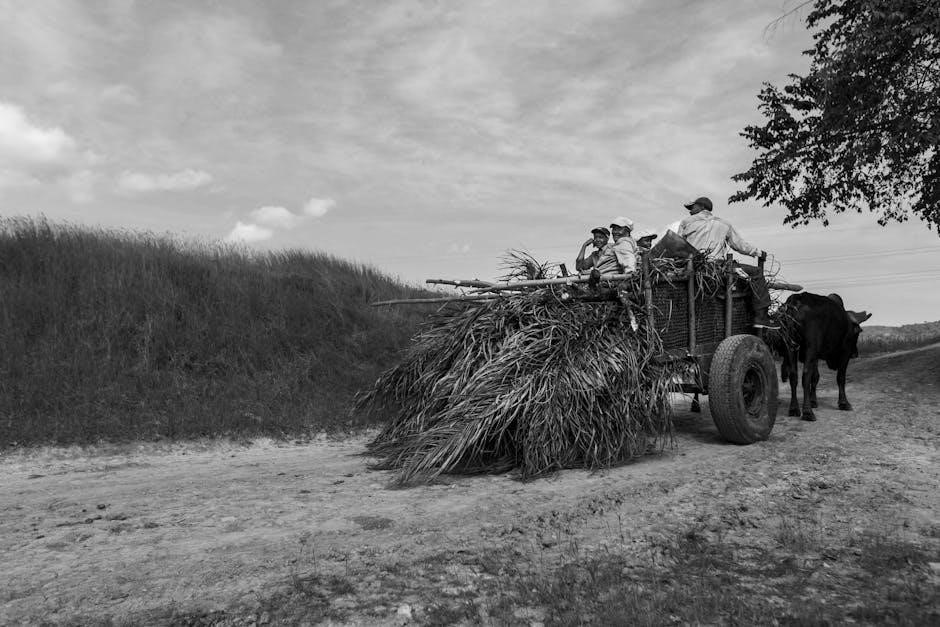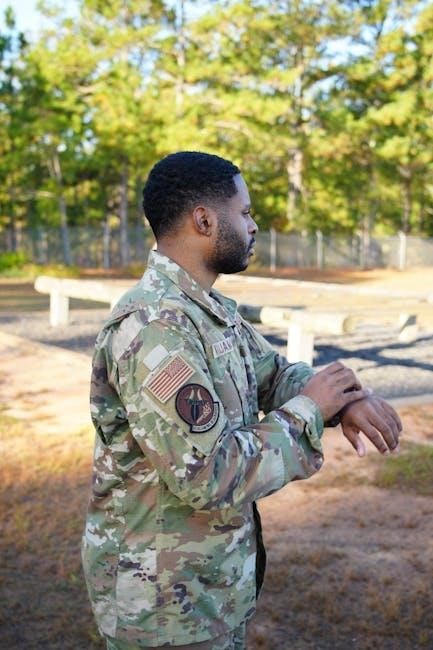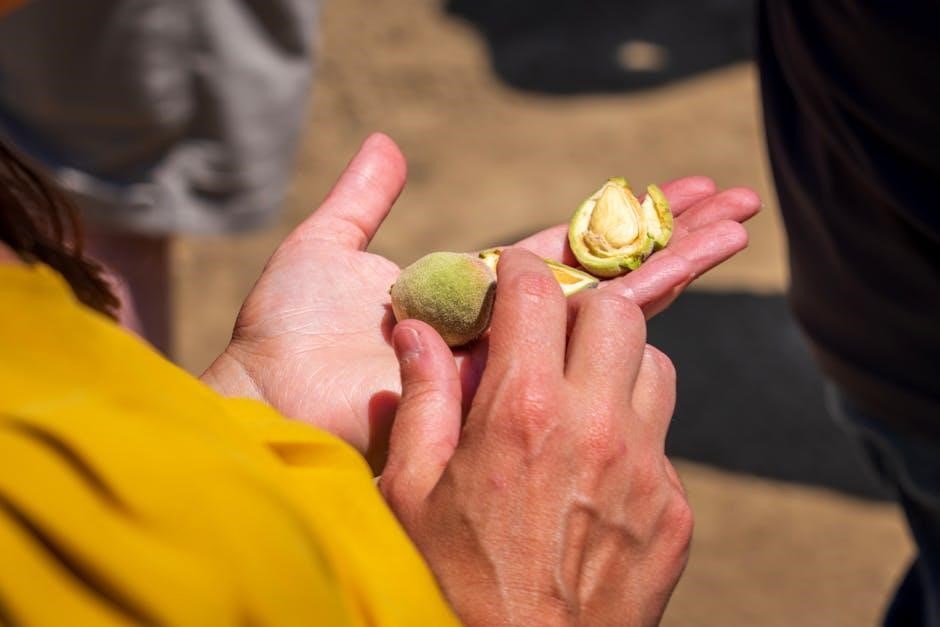The NJROTC Cadet Field Manual serves as a cornerstone for cadet training, providing essential guidance on leadership, drill, ceremonies, and core values. It is a vital reference for cadets to excel in the program.
1.1 Overview of the NJROTC Program
The NJROTC program is a high school curriculum focused on developing leadership, citizenship, and maritime education. It prepares students for future challenges by fostering teamwork, discipline, and self-confidence. Cadets engage in activities like drill, orienteering, and community service, while learning about naval traditions and core values. The program equips students with skills for success in both military and civilian life.
1.2 Importance of the Cadet Field Manual
The Cadet Field Manual is a crucial resource for NJROTC cadets, providing detailed guidance on uniform regulations, drill commands, and leadership development. It acts as a reference for ceremonies, physical fitness standards, and core values. The manual ensures consistency and proper conduct, making it an essential tool for cadets to achieve their full potential within the program and beyond.

Uniform Regulations and Grooming Standards
Uniforms and grooming standards are vital for discipline and professionalism, ensuring cadets present a unified and respectful image in all NJROTC activities and events.
2.1 Classification and Types of Uniforms
The NJROTC Cadet Field Manual outlines several classifications of uniforms, each serving specific purposes. These include the service uniform, dress uniform, and working uniform. Each type is designed to reflect professionalism and adherence to naval traditions. Proper identification and wear of these uniforms are essential for maintaining unit cohesion and respect for the program’s standards and heritage.
2.2 Proper Wear and Maintenance of Uniforms
Uniforms must be worn correctly, ensuring a neat and professional appearance. Cadets should adhere to specific guidelines for fit, authorized accessories, and cleanliness. Regular maintenance, such as pressing and proper storage, is essential to preserve the uniform’s condition.Cadets are expected to follow established protocols for cleaning and caring for their uniforms to maintain their longevity and present a sharp, military bearing.
2.3 Cadet Grooming Standards
Cadets must maintain a neat, professional appearance. Haircuts should be conservative, with no extreme styles or colors. Facial hair is typically prohibited, and nails must be clean and trimmed. Female cadets may wear minimal makeup and simple hairstyles that do not interfere with uniform wear.
Grooming standards promote discipline and uniformity. Regular inspections ensure compliance, reinforcing the program’s emphasis on personal pride and military bearing.

Physical Fitness and Training
Physical fitness is vital for building discipline and teamwork. Cadets engage in exercises that enhance strength, endurance, and agility, preparing them for challenges and fostering mental toughness.
3.1 Physical Fitness Requirements
Physical fitness is a cornerstone of the NJROTC program, fostering discipline and teamwork. Cadets must meet specific requirements, including push-ups, sit-ups, and a 1-mile run, to build strength, endurance, and agility. Regular exercises and tests ensure readiness, promoting mental toughness and physical health, essential for future challenges. These requirements prepare cadets for leadership roles and instill a lifelong commitment to wellness.
3.2 Training Exercises and Drills
Training exercises and drills are essential for developing discipline, teamwork, and military proficiency. Cadets participate in exercises that enhance leadership skills, such as team-building activities and simulated scenarios. Drills focus on precision, coordination, and adherence to commands, fostering unity and confidence. These activities prepare cadets for real-world challenges, ensuring they are well-equipped to handle responsibilities and contribute effectively to the program’s mission.

Drill and Ceremonies
Drill and ceremonies are fundamental to NJROTC training, teaching cadets discipline, teamwork, and precision. They prepare cadets for military events, fostering respect for tradition and protocol.
4.1 Basic Drill Commands
Basic drill commands are essential for maintaining order and discipline within the NJROTC. These commands, such as “Attention,” “At Ease,” and “Right Face,” guide cadets in executing precise movements. Mastery of these commands fosters unity and professionalism, preparing cadets for formal ceremonies and events. They are taught through practice and repetition to ensure accuracy and confidence.
4.2 Military Ceremonies and Protocols
Military ceremonies and protocols are vital for fostering discipline and unity among NJROTC cadets. These events, such as parades, flag ceremonies, and inspections, emphasize respect for tradition and authority. Proper etiquette, uniform wear, and synchronized movements are essential. Cadets learn to conduct themselves with precision and pride, reflecting the values of the program. These ceremonies strengthen camaraderie and prepare cadets for formal military traditions.

Leadership Development
Leadership development is a cornerstone of the NJROTC program, fostering decision-making, communication, and problem-solving skills. Cadets learn to inspire and guide others, preparing them for future challenges.
5.1 Key Leadership Competencies
Key leadership competencies in the NJROTC program include decision-making, communication, and problem-solving. Cadets develop self-awareness, emotional intelligence, and the ability to inspire others. These skills are cultivated through practical exercises and real-world applications, fostering responsible and ethical leaders. The program emphasizes teamwork, adaptability, and resilience, ensuring cadets are prepared to lead in diverse environments and challenges. Leadership is a core focus of the NJROTC curriculum.
5.2 Team-Building Activities
NJROTC emphasizes team-building through activities like orienteering, community service, and group challenges. These exercises foster collaboration, problem-solving, and mutual respect. Cadets learn to rely on each other’s strengths, building unity and cohesion. Team-building activities prepare cadets for collective success in drills, competitions, and real-world scenarios, reinforcing the program’s focus on camaraderie and shared goals.
Land Navigation and Orienteering
Land navigation and orienteering teach cadets map reading, compass use, and terrain interpretation. These skills enhance spatial awareness, strategic thinking, and leadership development in challenging environments.
6.1 Map Reading and Compass Use
Map reading and compass use are essential skills for NJROTC cadets, teaching them to interpret topographical maps, symbols, and scales. Cadets learn to use compass components like the bezel and base plate for precise direction-finding. These skills are fundamental for navigation and are critical in land navigation training, enhancing situational awareness and decision-making abilities in various terrains and conditions.
6.2 Orienteering as a Leadership Tool
Orienteering serves as a dynamic leadership tool in NJROTC, fostering teamwork, problem-solving, and strategic planning. Cadets navigate varied terrains using maps and compasses, enhancing their decision-making and adaptability. This activity builds confidence, promotes collaboration, and prepares cadets for future leadership roles by simulating real-world challenges in a structured, goal-oriented environment.

NJROTC Awards and Recognition
NJROTC offers various awards and ribbons to recognize cadets’ achievements, reflecting their dedication to core values like Honor, Courage, and Commitment. These accolades celebrate leadership and excellence.
7.1 Types of Awards and Ribbons
NJROTC cadets earn diverse awards and ribbons for academic, leadership, and community service achievements. Ribbons include those for drill team, academic excellence, and service. Each award signifies dedication to the program’s core values, like Honor, Courage, and Commitment, and encourages cadets to strive for excellence in all areas of their training and personal development.
7.2 Eligibility Criteria for Awards
Eligibility for NJROTC awards is based on cadets’ performance, participation, and adherence to core values. Cadets must demonstrate excellence in academics, leadership, or community service. Specific criteria vary by award, with units often setting additional requirements. Awards recognize dedication, teamwork, and commitment to the program’s mission, ensuring cadets are rewarded for their efforts and achievements in a fair and structured manner.
Core Values of the NJROTC Program
The NJROTC program emphasizes three core values: Honor, Courage, and Commitment. These principles guide cadets in developing strong character and leadership skills, fostering personal and professional growth.
8.1 Honor, Courage, and Commitment
Honor, Courage, and Commitment are the foundation of the NJROTC program. Honor promotes integrity and ethical behavior, Courage builds resilience, and Commitment fosters dedication to personal and team goals. These values are integrated into daily activities, ensuring cadets develop a strong moral compass and leadership skills essential for success. They are the guiding principles for every cadet’s journey in NJROTC.
8.2 Integration of Core Values in Training
The integration of Honor, Courage, and Commitment into NJROTC training ensures cadets embody these values in all activities. Through drills, community service, and leadership exercises, cadets learn to apply these principles in practical scenarios, fostering a culture of accountability and teamwork. This holistic approach prepares cadets for challenges, both within the program and beyond, by aligning their actions with the Navy’s core values.

The NATOPS Program
The NATOPS Program is a safety-focused initiative aimed at enhancing combat readiness and reducing aircraft mishaps through standardized procedures and rigorous training protocols for cadets.
9.1 Purpose and Objectives
The NATOPS Program’s primary purpose is to improve combat readiness and reduce aircraft mishaps by establishing standardized procedures and promoting safety awareness. It focuses on enhancing operational efficiency and ensuring adherence to strict protocols. Through comprehensive training and continuous evaluation, the program equips cadets with the skills necessary to maintain high safety standards and operational excellence.
9.2 Role in Combat Readiness and Safety
The NATOPS Program ensures uniformity in operating procedures, which is critical for combat readiness and safety. It reduces mishaps by enforcing standardized practices and promotes a culture of safety within the unit. By adhering to NATOPS guidelines, cadets and personnel minimize risks, enhance mission effectiveness, and maintain operational integrity, contributing to overall organizational success and safety.

Community Service and Citizenship
Community service and citizenship are vital components of the NJROTC program, fostering cadets’ engagement in volunteer activities and service projects that strengthen societal bonds and leadership skills.
10.1 Importance of Community Involvement
Community involvement is a cornerstone of the NJROTC program, fostering a sense of responsibility and civic duty among cadets. By participating in service projects, cadets develop leadership skills, teamwork, and empathy while contributing to the betterment of their communities. Such activities strengthen the bond between military and civilian life, preparing cadets for active citizenship and future leadership roles. Community service enriches both the individual and society, aligning with the NJROTC’s mission to develop well-rounded individuals ready to serve.
10.2 Service Projects and Activities
Service projects and activities are vital components of the NJROTC program, fostering teamwork and community engagement. Cadets participate in food drives, environmental cleanups, disaster relief efforts, and mentoring programs. These activities promote leadership, compassion, and a sense of responsibility. By giving back, cadets strengthen community bonds, embodying the NJROTC’s commitment to service and citizenship. Such experiences prepare them to contribute positively to society as future leaders.

Cadet Field Manual as a Resource
The NJROTC Cadet Field Manual is a comprehensive guide, serving as a personal resource for cadets. It contains essential information on drill, uniforms, and core values, ensuring success in the program and beyond.
11.1 Structure and Content of the Manual
The NJROTC Cadet Field Manual is meticulously structured into twelve main sections, each addressing critical aspects of cadet training. It covers uniform regulations, drill commands, physical fitness, leadership development, and community service. The manual also includes detailed chapters on land navigation, core values, and the NATOPS program, ensuring a holistic approach to cadet education and development.
11.2 Practical Applications of the Manual
The NJROTC Cadet Field Manual is a daily resource for cadets, providing clear guidance for uniform inspections, drill practices, and leadership exercises. It aids in preparing for ceremonies and competitions, while its practical lessons in navigation and core values empower cadets to excel in both academic and extracurricular activities, fostering personal growth and teamwork.
The NJROTC Cadet Field Manual is an indispensable guide, equipping cadets with the knowledge and skills needed for success, fostering leadership, discipline, and a strong moral foundation.
12.1 Summary of Key Points
The NJROTC Cadet Field Manual is a comprehensive guide designed to equip cadets with essential skills and knowledge. It covers leadership development, uniform regulations, physical fitness, drill, and core values like honor, courage, and commitment. The manual emphasizes community service, orienteering, and the NATOPS program, fostering discipline and teamwork. Its structured content ensures cadets understand their roles and responsibilities, preparing them for future challenges and leadership opportunities.
12.2 Final Thoughts on the NJROTC Cadet Field Manual
The NJROTC Cadet Field Manual is an indispensable resource for cadets, offering guidance on leadership, discipline, and skill development. It fosters personal and professional growth, preparing cadets for challenges beyond the program. By emphasizing core values and practical applications, the manual ensures cadets develop into responsible, capable individuals. Its impact extends beyond academics, shaping character and instilling lifelong skills essential for success.
